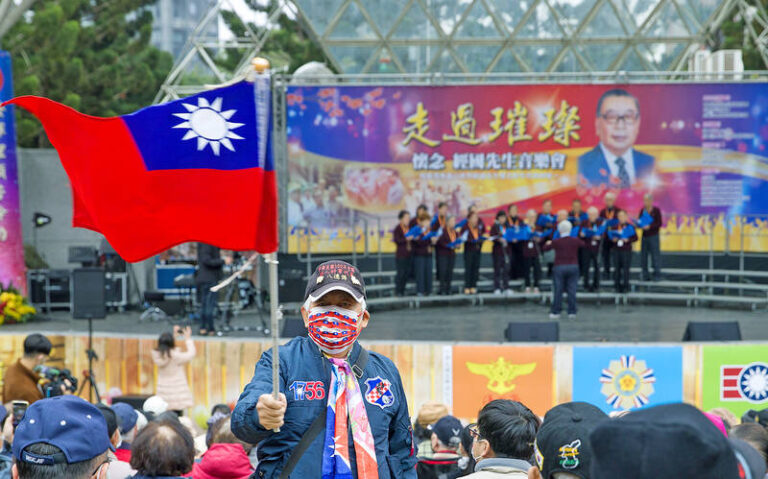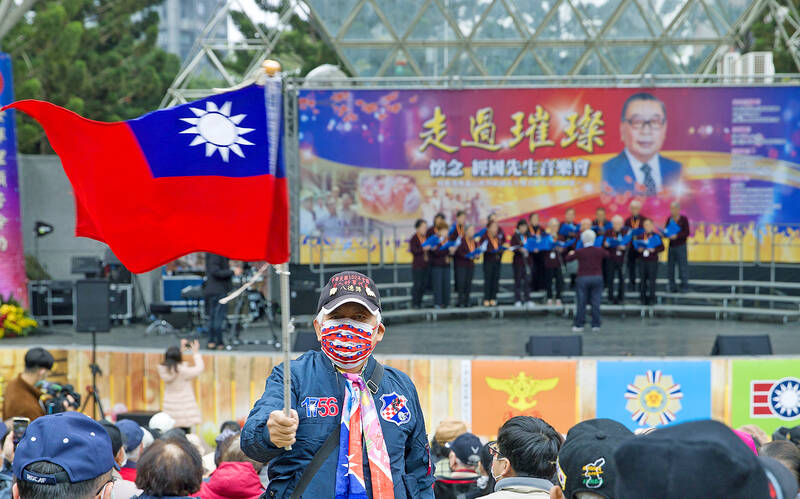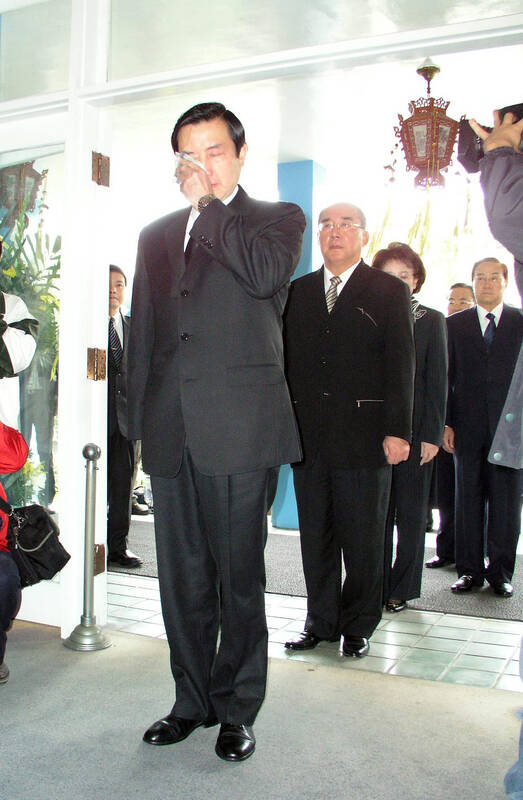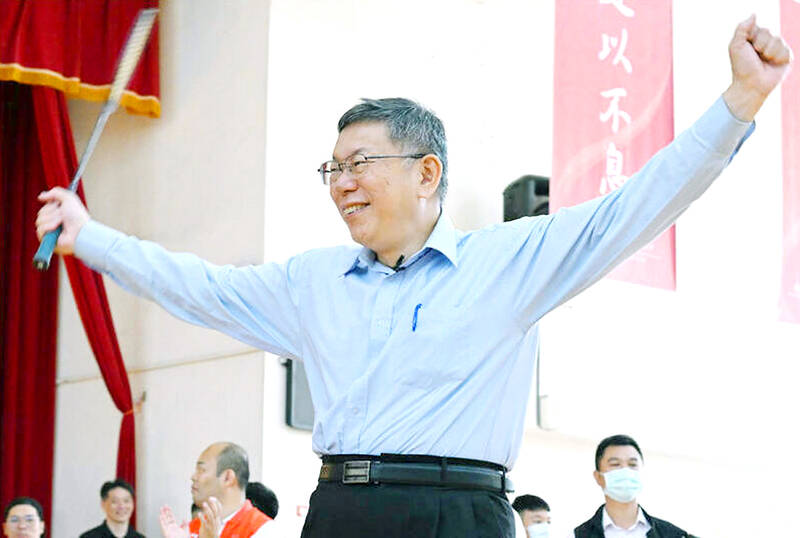
[ad_1]
Ko Wen-je’s broad appeal to both deep blues and light blues, comes through his channeling the cult of Chiang, while emulating Chiang the politician
-
By Michael Turton / Contributing reporter
In January of 2006 a group of pan-Blue politicians made the pilgrimage out to the grave of former President Chiang Ching-kuo (蔣經國) for the 18th anniversary of his death, an event considered newsworthy enough for the English papers to comment on it.
Among the politicians were John Chiang (蔣孝嚴), who claimed to be the illegitimate son of Chiang Ching-kuo, Ma Ying-jeou (馬英九), who would later become president, and James Soong (宋楚瑜), then the leader of the People’s First Party (PFP), who would go on to lose presidential elections like no other man in Taiwan history.
Ma Ying-jeou, who served as Chiang Ching-kuo’s English translator, cried at the tomb that day, saying that he would carry out Chiang’s wish that he become a politician of integrity. Soong positioned himself as a follower of Chiang. All three thus related themselves back to Chiang.

Photo: CNA
THE CHARISMA OF CHIANG
In any cult the crucial moment occurs when the charismatic founder dies and the followers have to decide who gets the charisma and the accompanying power. In many cults, the result is a rift between family members and their supporters and associates and their supporters. These rifts gave us Sunni and Shia Islam, the two Mormon Churches and two American Black Muslim groups, among others.
In the Chinese Nationalist Party (KMT), this moment occurred when Chiang Ching-kuo died in 1988 without a clear heir, and left open the question of who inherited the Chiang charisma: was it followers and associates like Soong and Ma, or family members like John Chiang? This issue was never resolved.

Photo: Chou Min-hung, Taipei Times
Between 2000-2008 a great shift occurred in the KMT as both the Chiang charisma and the Return to China theology, related but different aspects of the KMT’s colonial identity, faded into history. In a way the two fused: the search for charismatic legitimacy and the theology of return were reconstructed as the KMT’s commitment to make Taiwan part of China.
In the 2000 elections, Su Chi (蘇起) popularized the term “1992 Consensus,” signaling that the KMT had broken with its Return to China theology and began to drift in another direction. Imagine Chiang Kai-shek (蔣介石) in his heyday accepting or supporting a “consensus” that conceded the existence of the People’s Republic of China (PRC) as merely a different interpretation of China!
In 2005, KMT heavyweight and 2000 and 2004 presidential candidate Lien Chan (連戰) visited China, cementing the KMT’s commitment to the new theology and the new source of charisma. That same year the KMT had a bruising Chairmanship election between Wang Jin-pyng (王金平), long seen as the leader of the Taiwanese KMT, and Ma Ying-jeou. It was a key moment, perhaps the last, when the KMT could have become a Taiwan-centric party lead by an influential Taiwanese politician. Instead, the Mainlanders and their colonial elites retained their hold on the party.

Photo: Liao Chia-ting, Taipei Times
Current KMT presidential candidate Hou You-yi (侯友宜) sometimes harks back to Chiang Ching-kuo, as he did last month when he said that Chiang made some “bold moves” to make Taiwan more democratic, but never as the source of ruling charisma. Instead, he treats Chiang the way Lee Teng-hui (李登輝) did, as a competent technocrat and an icon of economic growth, but not as the progenitor of a great charismatic legacy.
KO WEN-JE AS CHIANGIST
Ironically, the leading Chiangist is actually Ko Wen-je (柯文哲), the former mayor of Taipei and head of the Taiwan People’s Party (TPP), who as a thinker is little more than a prisoner of the conventions of his generation of males. He came of age in the Chiang Ching-kuo era, and has been spouting pro-Chiang banalities since he came onto the political stage.
In September of 2014, according to a very interesting piece on the Chiang legacy at Ketegalan Media, Ko said, “Chiang Ching-kuo is the prime example of how officials should behave and conduct their relationships with the powerful and wealthy. Everyone in politics should learn from Chiang.”
This is the same Chiang who ran the nation’s security apparatus, with its arbitrary detentions, torture, killings, and authoritarian surveillance state, and then governed as a dictator. Nor is this the only such remark of Ko’s. As the author of the piece above noted, Ko’s “brand of a ‘non-politician’ is just channeling Chiang’s image of a ‘friend of the people.’”
This is one reason that Ko is so acceptable to the pan-blues, light and dark: his attempt to align himself with the Chiang charisma while consciously modeling himself on Chiang the politician. He looks somehow familiar to them.
Chiang Ching-kuo’s dead hand continues to shape Taiwan in other ways, particular in the way people in Hou and Ko’s generation think about the economy. In their youth Taiwan sometimes grew at 8 percent a year. When KMT 2020 candidate Han Kuo-yu (韓國瑜) ran on a “make everyone rich” platform, he was alluding to that era. That generation thus imagines that real economies can be made to grow that way, and if they are not, something must be wrong.
Ko’s recent remarks to a delegation from Japan’s ruling Liberal Democratic Party not only reflect this bizarre understanding of the economy, but are borderline anti-democracy. According to a TPP statement, Ko told the Japanese delegation that Taiwan has been idle for 30 years due to the ideological struggle over Taiwan independence versus unification with China.
The last 30 years of being “idle” is the period of democratization in Taiwan. Terry Gou (郭台銘), the founder of Hon Hai Group and perhaps presidential candidate this election, once famously and similarly said that “democracy does not put food on the table.” Widespread in that generation is the assertion that democracy has lead to chaos. Shaped by the legacy of authoritarianism, that generation feels that politics must be “orderly” and that public disagreement means disorder.
Ko’s need to refer to his IQ is another legacy of Chiang as authoritarian technocrat: leadership means giving orders. Naturally, smart people give better orders and thus by right of this merit should lead, right?
The Chiang-worshiping factory owners who grew rich in the 1980s moved their firms to China in the 1990s and then blamed Taiwan for not having an economy in the 2000s. The economic formulas they have long pushed, including suppressed wages for labor, industrial zones and science parks, export dependence, the cult of GDP, and a land development-driven domestic political economy, continue to prevent the real change that Taiwan needs.
Last week the chairman of the Third Wednesday Club, a major business group, said that Taiwan could not raise wages more than 2 percent.
That’s the real legacy of Chiang, and it is killing Taiwan.
Notes from Central Taiwan is a column written by long-term resident Michael Turton, who provides incisive commentary informed by three decades of living in and writing about his adoptive country. The views expressed here are his own.
Comments will be moderated. Keep comments relevant to the article. Remarks containing abusive and obscene language, personal attacks of any kind or promotion will be removed and the user banned. Final decision will be at the discretion of the Taipei Times.
[ad_2]